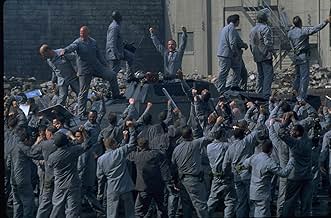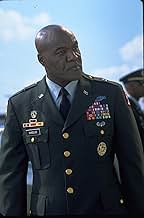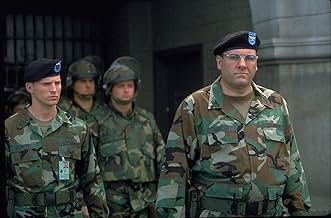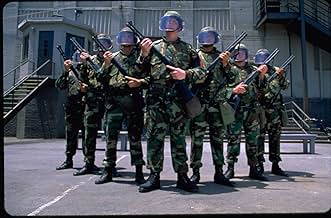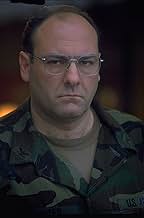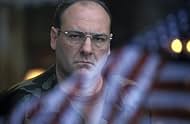Un général en cour martiale rassemble 1200 détenus pour se lever contre un directeur corrompu et sadique.Un général en cour martiale rassemble 1200 détenus pour se lever contre un directeur corrompu et sadique.Un général en cour martiale rassemble 1200 détenus pour se lever contre un directeur corrompu et sadique.
- Prix
- 1 victoire et 4 nominations au total
Histoire
Le saviez-vous
- AnecdotesJames Gandolfini was reportedly reluctant to accept the role of Colonel Winter because he didn't understand the story and had never served in the military. He committed largely on the strength of a lengthy speech Winter delivered in the original script. Ironically, the scene was cut from the final film.
- GaffesIt was an error to have Irwin be a 3-star general. 3-star and 4-star generals hold their ranks temporarily, as long as they occupy a 3-star or 4-star position. When they are transferred from one 3- or 4-star position to another, the President must re-nominate them for Senate confirmation. If an officer is relieved (fired) from one of those positions, he reverts to 2-star by operation of law unless awaiting retirement (and then only for 60 days). Irwin was court-martialed, so the Army certainly wouldn't keep him in a 3-star slot. They'd relieve him and he'd go to court-martial as a 2-star. See 10 USC 601.
- Citations
Irwin: [narrating first lines] Take a look at a castle. Any castle. Now break down the key elements that make it a castle. They haven't changed in a thousand years. 1: Location. A site on high ground that commands the territory as far as the eye can see. 2: Protection. Big walls, walls strong enough to withstand a frontal attack. 3: A garrison. Men who are trained and willing to kill. 4: A flag. You tell your men you are soldiers and that's your flag. You tell them nobody takes our flag. And you raise that flag so it flies high where everyone can see it. Now you've got yourself a castle. The only difference between this castle and all the rest is that they were built to keep people out. This castle is built to keep people in.
- ConnexionsFeatured in HBO First Look: Inside the Walls of 'The Last Castle' (2001)
- Bandes originalesChiseled in Stone
Written & Performed by Dean Hall
The castle in question here is a maximum security military prison, home to the armed forces' toughest offenders. The whole place is ruled by Col. Winter (James Gandolfini), a tinpot tyrant who delights in turning his prisoners against one another. Make them forget they are soldiers, make them forget they are MEN, and you will win...that's Winter's philosophy. Then, a monkey wrench is thrown into the works, in the form of Gen. Eugene Irwin (Robert Redford), a much-decorated three-star general court-martialed for a battlefield infraction. Irwin immediately sees Winter for what he is, and as his weeks in the prison wear on, he begins to realize that he is surrounded by SOLDIERS, tough, competent, and ready to fight. All they need is a general to get behind...and a villain to rally against.
"The Last Castle" is a character-driven piece, and is carried by the strengths of its performances. Robert Redford takes a character who is admittedly rather sketchily written and, through sheer force of his charisma and personality, turns him into someone quirky and specific. Irwin is more like the Sundance Kid than any character Redford has played in some time: a rebel battling against a system that has arrayed insurmountable odds against him. This time, however, Irwin is a product of the system, and he knows its rules. Redford conveys that wisdom with a bemused grin or a mere flex of his craggy but still handsome face. This, folks, is star power.
The actors surrounding him put in equally fine work. James Gandolfini is miles away from "The Sopranos" as the despotic Col. Winter, and makes him a fine villain, loathsome yet pathetic and curiously affecting at the same time. Mark Ruffalo comfortably wears the role of the prison bookie, a cynic whose father was a Vietnam P.O.W. with Irwin, and Clifton Collins, so creepy and evil as the assassin Frankie Flowers in "Traffic", turns in a drastically different turn here as a stuttering corporal who first recognizes Irwin's greatness.
Lurie helms this material with assured confidence. He gives the film a gritty, authentic look and feel, he knows how to recognize a dramatic moment and pay it off, and he handles the film's quieter scenes and its boisterous action payoffs with equal elan. Any way you slice it, it's just good filmmaking.
Though David Scarpa and Graham Yost spike their screenplay with memorable moments and fine dialogue, they shoot themselves in the foot with third-act implausibilities (you'll find yourselves asking more than once, "Now how did they manage to throw THAT together?") and an abrupt finale that leaves too many unanswered questions.
Still, even with these problems, "The Last Castle" is a solid, rousing piece of mainstream entertainment. It's well-made, it tells a good story without insulting your intelligence or your good taste, and it showcases some fine acting by veterans and newcomers alike. And I bet Lurie didn't even break any of his cameras. I'm sure Dreamworks appreciates that, if nothing else.
- uglykidmatt
- 21 oct. 2001
- Lien permanent
Meilleurs choix
- How long is The Last Castle?Propulsé par Alexa
Détails
- Date de sortie
- Pays d’origine
- Site officiel
- Langue
- Aussi connu sous le nom de
- The Last Castle
- Lieux de tournage
- sociétés de production
- Consultez plus de crédits d'entreprise sur IMDbPro
Box-office
- Budget
- 72 000 000 $ US (estimation)
- Brut – États-Unis et Canada
- 18 244 060 $ US
- Fin de semaine d'ouverture – États-Unis et Canada
- 7 088 213 $ US
- 21 oct. 2001
- Brut – à l'échelle mondiale
- 27 642 707 $ US
- Durée2 heures 11 minutes
- Couleur
- Mixage
- Rapport de forme
- 2.35 : 1
Contribuer à cette page




